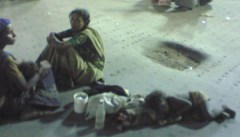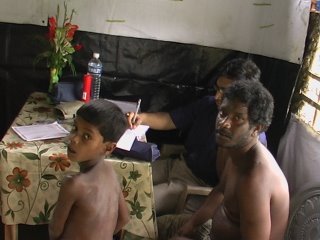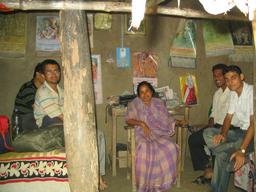"..And in its dark dingy lanes today I had a tryst with life."
I came across a different world today,may be the real world.Right at
the heart of kolkata, which is making great headaway with its
malls,high-rises and skyscapers,there lie sprawling slums with
conditions so deplorable that you might just doubt if you are at the
gateway to hell. And in its dark dingy lanes today I had a tryst
with life.
We were initiated with a tour of the large slums stretching in and
around Tollygunge.I had never set my foot on a place like that
before.Alleys one can barely scrape through took us to the most
deprived corners of the city.Women were busy cooking their meagre
mid-day meals in the dingy rooms,at most 6 by 6 feet,crammed with
furnitures and possessions ,which would probably be cast off by us
without as much as a second thought.In many cases I noticed that the
cooking went on dangerously beside plastics and rags serving as
curtains and sometimes even as walls.The breadearners of the
families in these shanties range from beggars to thieves,from
rikshawalas to hawkers.Each family has some 5-6 inmates including 3-
4 children,mostly malnourished and without proper education
facilities.Health and hygiene is a sordid state of affair.With no
proper sanitation and a choked creek flowing right through the slum,
the stench is unbearable.It's difficult to imagine the woes of the
people living there without the very basic necessities like supply
of clean water.Surprisingly though, many of these families own a
colour television set,all turned on to some `k'-serial at that hour
of the day.
These shanties , poor and harmless as they might seem in the
daytime,become hubs of criminal activities as darkness sets in.With
illicit flow of booze and drugs,thriving brothels and several other
illegalities, the environment is too stressful for children like
Arpita,Debapriya and Rinki to have a healthy development,both
mentally and physically.As I learnt from our friend,the popular
Chanchalda,a local resident without whose help we couldnot have
entered the place,let alone talk with the inmates, that at one point
of time random rapes and murders were too common here.But the
situation has improved since a lot of NGO's have roped in.Tomorrow's
Foundation is one of them.
TF is an NGO that works with slum and street children and aims at
delivering quality rather than quantity.They coach poor children
in collaboration with some other organizations and admit them in
formal schools at the end of their training sessions.The more
promising ones are then selected and TF takes special care to see
that the child reaches its full potential.Given that many of these
slum children are first-generation school-goers, TF has done a fair
job in that many of their students from these communities now teach
at their centres.The most successful of them is Anil who has scored
64.3 % in his HS examination this year.
As our friend showed us around, I spoke to many who were taken care
of by TF.There were students of all ages,mostly girls ,shy and
obedient.In many cases the mothers were most willing to send in
their children to schools whereas in some cases the families had
married off their teenage daughters or had sent them to work in some
obscure place . Again there were students who were obstinate and
refused to attend school irrespective of all coaxing and cajoling.I
met three who are supposed to appear for their higher secondary next
year.One of them wants to join the police force and one wants to
teach English.God willing,their dreams would come true.
I am not particularly good at recounting my experience and seek
desperate help to see me through. But here I shall make an
attempt ,risking failure though, to share a thought or two.As I
reached the end of the slum , I saw a thick wall separating a high-
rise building from the dilapidated shanty The dichotomy was
striking –two worlds on the two sides of a wall. I just wondered if
one person from this side broke into the other's territory,whose
fault would it actually be?
The Tollygung slums were the most depressive place I had ever
visited in my life.An environment so hopeless was sure to blunt
anybody's zeal and motivation.Just as I was pondering over this, a
whiff of fresh flowers made me look around.I wish I could capture
that one moment on reel.A group of women, both elderly and young had
gathered in a room to string flowers. Strewn all over the earthen
floor, the flowers had a smell so fresh and colours so bright that
for a moment they seemed not to fit in the otherwise grim
surrounding.
After the day's journey, as I walked back to TF's field office ,I
thought about the faces I had met .Our lives are so different.We
were born lucky,lucky enough to have an emotional and financial
security right from the start.And that has made us selfish.Besotted
with our daily woes we seldom face the fact that a problem far
greater than ours exists,The question of that of survival . I
agree that all our troubles and sufferings are very unique for
us.But for people like Rinki and Moumita,the struggle goes on as
they continue to live on the edge , undaunted and ready to face all
the challenge destiny has in store for them. Taking a close look at
their lives you might just pause for a moment and wonder if our
little cares are not figments of imagination.
We have won a lottery at birth,that's it. What would it have been
like if we were born in their place ?
Sreyoshi
.jpg)
.jpg)
.jpg)











